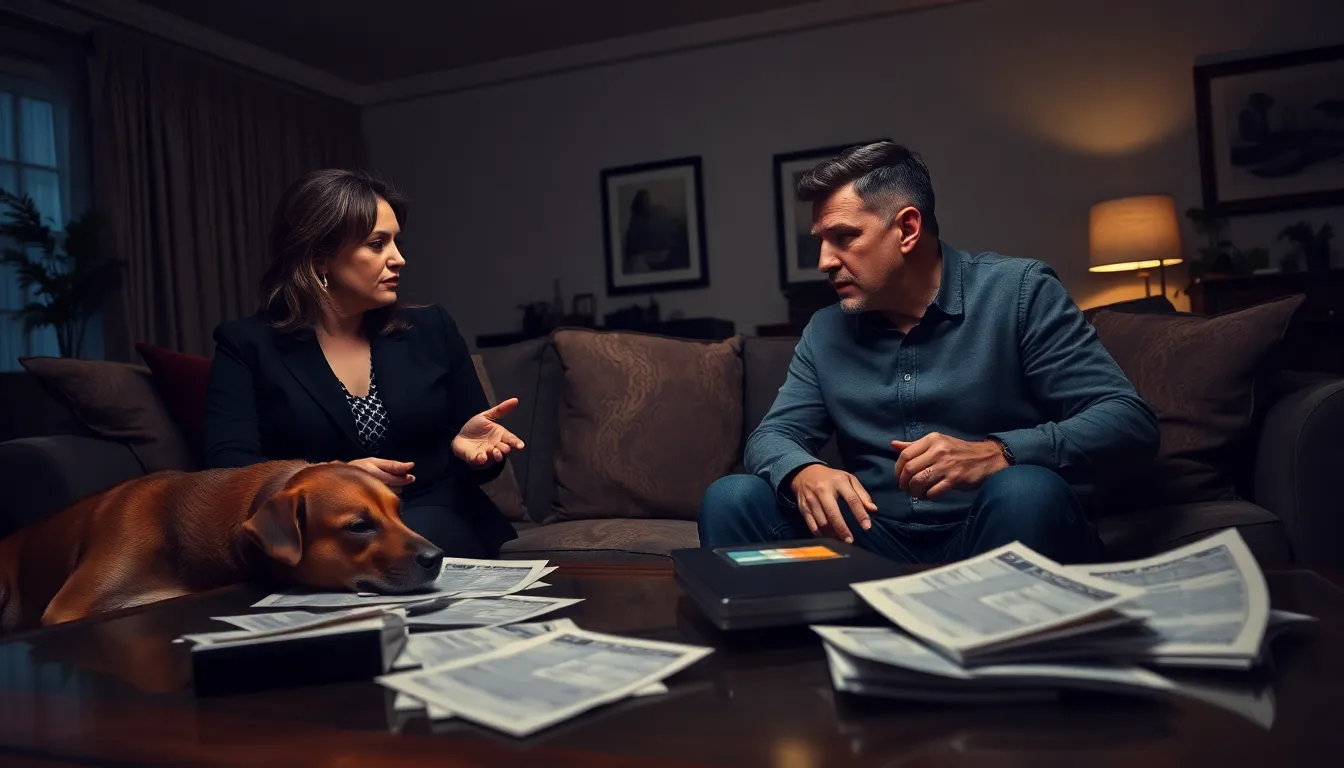A deeply personal financial decision ignited a severe relationship conflict when a Pet Owner Spent Thousands To Help His Sick Dog Walk Again, But His Girlfriend Called Him Selfish For Not Paying Her Struggling Sister’s Rent. This contentious situation unravels the complex interplay between individual financial autonomy, the emotional commitment to a pet, and the perceived obligations to extended family.
Key Implications
- Financial Preparedness for Pet Healthcare: The owner’s substantial £8,500 outlay for his dog’s emergency surgery underscores the critical importance of financial readiness, through savings or pet insurance, to cover unexpected and significant veterinary expenses without causing personal hardship.
- Relationship Values and Financial Boundaries: The dispute highlights how differing perspectives on money allocation, particularly between pet care and familial support, can expose fundamental value clashes and strain relationships, necessitating clear discussions about financial boundaries.
- Personal Accountability Versus Familial Obligation: The owner’s refusal to assist his girlfriend’s sister, citing personal responsibility for “poor life choices,” illustrates a core conflict between an individual’s belief in self-reliance and external expectations for communal financial support within a relationship.

Significant £8,500 Surgical Investment for 9-Year-Old Dog
A challenging situation recently emerged for a pet owner with his beloved 9-year-old dog. Just a few weeks ago, the canine companion unexpectedly lost the use of its back legs. This critical health issue necessitated immediate and urgent medical intervention to restore mobility.
To address this severe condition, the owner elected for an emergency surgery. This vital procedure carried a substantial price tag. The total cost of the dog’s life-altering operation amounted to a £8,500 out-of-pocket payment.
All funds for this emergency treatment were paid directly by the owner, indicating no insurance coverage or alternative payment methods were used. This direct financial outlay highlights a significant commitment. The owner’s financial status, described as “well off” with “plenty saved up,” allowed this substantial payment to occur without personal hardship. The ultimate decision was to avoid the distressing necessity of putting the dog down.
The Critical Urgency of Pet Mobility Loss
The sudden inability of a 9-year-old dog to use its back legs represents a severe and time-sensitive crisis. Such conditions frequently demand prompt, specialized veterinary attention. Immediate action is often crucial to prevent irreversible damage or a decline in the animal’s quality of life. The owner’s swift response in this scenario was absolutely vital.
Emergency veterinary care, particularly complex surgical procedures, can incur considerable expenses. Pet owners frequently face rapidly rising vet bills for essential and unexpected treatments. Understanding these potential financial commitments is a crucial aspect of responsible pet ownership today. Many factors contribute to why health care for pets has been surging.
The choice to proceed with an expensive surgery, rather than considering euthanasia, underscores a profound emotional bond. It reflects an unwavering commitment to the animal’s welfare. For many dedicated pet parents, this deep connection often takes precedence over purely economic considerations.
Financial Preparedness for Unexpected Pet Health Crises
The owner’s capacity to cover the £8,500 emergency surgery immediately proved instrumental. His established financial stability meant this significant cost did not create a substantial burden. This situation powerfully illustrates the importance of robust financial preparedness for unforeseen pet health challenges.
Unfortunately, many pet owners encounter immense difficulties when high veterinary bills arise. A significant number of families struggle to afford essential veterinary care. These financial pressures can lead to heartbreaking and difficult decisions. Studies reveal why many pet owners cannot afford veterinary care today.
While not every owner possesses extensive savings, proactive measures are available. Securing comprehensive pet insurance or establishing a dedicated emergency fund can provide a vital safety net. These steps ensure beloved pets receive necessary medical attention, safeguarding their health and the owner’s peace of mind.
A dedicated pet owner spent thousands to help his sick dog walk again, demonstrating an unwavering commitment. This profound action prioritizes the beloved companion’s health and longevity. The choice to invest significantly in a pet’s life is a deeply personal and often emotional decision.
However, such substantial financial commitments can sometimes elicit strong reactions from others. In this specific context, the owner’s girlfriend reportedly called him selfish for not paying her struggling sister’s rent. This highlights the complex interplay between personal finances, family obligations, and pet welfare.
When the cost of pet ownership soars, families sometimes face extremely tough decisions, sometimes involving surrendering a pet. Yet, for this particular owner, preserving his 9-year-old dog’s life and restoring its mobility was the paramount concern. This underscores the personal commitment to a pet’s welfare that often defines the human-animal bond.
The emotional and ethical considerations surrounding a pet’s health frequently extend beyond simple monetary value. For countless individuals, a pet is an integral family member. Their well-being often represents a non-negotiable priority, irrespective of external opinions or alternative financial demands. This situation exemplifies the profound depth of an owner’s bond with their pet.

Girlfriend Demands Aid for Sister’s Multi-Month Rent Arrears
A recent personal conflict has brought into sharp focus the tension between individual financial choices and familial obligations, particularly when a pet owner spent thousands to help his sick dog walk again. This compassionate act, however, became the subject of intense criticism when his girlfriend demanded he financially assist her sister. Her sister had accumulated several months of unpaid rent, resulting in an imminent potential eviction, prompting the girlfriend to seek immediate and substantial aid from her partner.
The Sister’s Dire Financial Predicament
The girlfriend’s sister faced a critical housing crisis after accumulating rent arrears over a few months. This severe financial predicament placed her at significant risk of eviction, creating immense stress for her and her family. Her struggle was directly attributed to a recent relationship breakdown, which left her unable to afford her current residence independently. The unexpected change in her living situation necessitated urgent intervention, and her sister, feeling immense pressure, looked to her partner for a solution.
The severity of the situation escalated rapidly. Without immediate assistance, the sister faced the harsh reality of losing her home. This created an emotional burden for the girlfriend, who felt a strong responsibility to protect her sibling. She viewed her partner’s substantial assets and spacious living situation as a clear avenue for relief, leading her to make bold demands for both financial assistance and accommodation.
The Girlfriend’s Sharp Comparison and Ultimatum
The core of the dispute revolved around a direct comparison between the pet owner’s expenditures on his animal companion and his perceived lack of support for her struggling sister. The girlfriend specifically highlighted the significant sum of £8.5k spent on the dog’s surgery. This expensive procedure was undertaken with the admirable goal of enabling his sick dog to regain the ability to walk, clearly demonstrating the owner’s deep commitment and emotional investment in his pet’s welfare. However, from the girlfriend’s viewpoint, this substantial investment represented a stark and unfair misprioritization of available funds. She felt that the needs of a human family member facing homelessness should undeniably take precedence over even the most critical pet medical expenses.
Her frustration culminated in a powerful and direct quote. She challenged her partner’s values by stating, “You’d spend eight grand on a dog but you won’t even help my sister keep a roof over her head?” This pointed remark was designed to underscore the perceived disparity in his financial priorities. The girlfriend further suggested a practical solution for her sister’s housing problem: she could move into the pet owner’s one 4-bedroom home. This proposal aimed to resolve the immediate crisis by leveraging his available resources.
This conflict illuminates the complex ethical and emotional landscape within a romantic relationship, especially when extended family needs intersect with personal financial decisions. The fact that the pet owner spent thousands to help his sick dog walk again demonstrates a deep bond and commitment, an investment many dedicated pet owners can understand. Veterinary care costs, particularly for complex surgeries and long-term treatments, are often substantial and can represent unforeseen financial burdens for households. Exploring topics like why health care for pets has been surging provides crucial context for such significant expenditures. However, his girlfriend perceived this financial choice as a direct act of prioritizing an animal’s comfort over a human family member’s most basic necessity of shelter, leading to her accusations of selfishness.
The boyfriend’s refusal to assist with rent or offer accommodation, despite owning a large home, suggests differing views on financial boundaries and shared responsibility within their relationship. This incident quickly escalated, and his girlfriend called him selfish for not paying her struggling sister’s rent, which highlights a fundamental clash in their expectations. Such disagreements can place immense strain on a partnership, revealing underlying values and assumptions about mutual support. When families face unexpected costs, tough decisions are inevitable, sometimes forcing owners to confront difficult choices, as discussed in reasons why families surrender pets.
The tension arising from this situation underscores the need for clear communication and agreed-upon financial boundaries within a relationship. While the girlfriend felt an undeniable obligation to her sister, appealing to her partner’s resources, the pet owner’s perspective might have centered on personal financial autonomy and a lack of direct responsibility for his partner’s sister’s individual circumstances. This fundamental difference in how they define mutual support and shared financial burdens is often at the heart of such relationship conflicts. It highlights that even strong emotional connections can be tested when significant financial pressures from outside the immediate couple arise, especially when large sums of money are involved in seemingly disparate areas of life.
The scenario also raises questions about personal accountability versus collective responsibility. While the girlfriend felt an obligation to her sister, the pet owner might have believed the sister’s financial issues were not his direct responsibility, especially given their root cause in a relationship breakdown. This difference in perspective can be a significant source of contention. Many households grapple with unexpected expenses, and a survey finds many pet owners cannot afford veterinary care, further demonstrating the widespread nature of financial strain across various household budgets.

Owner Refuses Financial Aid for Sister, Citing Personal Accountability
A recent dispute highlights the complex dynamics of financial responsibility within modern relationships. A pet owner spent thousands to help his sick dog walk again, but his girlfriend called him selfish for not paying her struggling sister’s rent. This situation led to the owner explicitly refusing to provide financial support for his girlfriend’s sister’s rent or allow her to move into his substantial 4-bedroom home, citing a firm belief in personal responsibility for financial decisions.
The core of the disagreement revolves around differing philosophies on financial aid and familial obligation. The owner’s decision has sparked a debate on where personal financial commitments end and familial support begins, particularly when significant personal expenses, such as urgent pet healthcare, are involved. This scenario underscores how deeply intertwined financial choices and personal values can become within a relationship.
The Discrepancy in Financial Prioritization
The owner’s commitment to his pet was undeniable, manifesting as a significant expenditure of £8.5k on his dog’s surgery. This sum, invested in an existing dependent’s well-being, became a central point of contention for his girlfriend. She perceived this substantial outlay as an available resource that could have been redirected to alleviate her sister’s financial distress, particularly for rent.
From the girlfriend’s perspective, the owner’s choice to spend thousands on his dog while simultaneously refusing to help her struggling sister appeared “selfish” and “cheap.” This viewpoint suggests an expectation that a partner should extend financial generosity to family members in need, especially when they demonstrably possess the means. The rising cost of pet care, including surgeries and ongoing treatments, often forces pet owners into tough decisions about their pets’ welfare, yet these costs are not always understood by those outside the pet-owner relationship.
However, the owner’s stance reflected a different set of priorities. He likely viewed the £8.5k as a necessary expense for a direct, pre-existing commitment to his pet’s health. This is a common challenge many pet owners face, as healthcare for pets has been surging, leading to significant vet bills. His refusal to fund his girlfriend’s sister’s rent or offer housing suggests a clear delineation between his responsibilities for his own household and external family matters. Many pet owners cannot afford veterinary care, highlighting the financial burden that the owner willingly undertook for his dog.
Upholding Boundaries: Home and Individual Accountability
Beyond the financial aid for rent, the owner’s refusal extended to denying his girlfriend’s sister a place in his 4-bedroom home. This decision is crucial as it signifies not just a financial boundary but also a boundary concerning his personal living space and long-term commitments. A 4-bedroom home represents a substantial tangible asset, and the offer to move in was a significant proposal, yet one the owner unequivocally rejected.
His perspective, articulated as “I shouldn’t have to suffer for another person’s poor life choices,” underpins his firm stance. This statement indicates a belief that individuals are primarily accountable for their own financial situations and life decisions. While offering a room might seem like a compassionate gesture to some, the owner clearly established that his property was not a solution for another adult’s financial difficulties. This explicit refusal demonstrates a strong commitment to defining and maintaining personal and financial boundaries.
The owner’s prioritization suggests he perceives a distinction between supporting immediate dependents, like his dog, and intervening in the financial affairs of an adult relative. His decision highlights the growing discussion around individual autonomy and the extent of familial responsibility, particularly when it impacts one’s personal finances and living arrangements. For him, extending aid beyond certain defined lines would imply enduring the consequences of someone else’s choices, a burden he explicitly refused to carry.
Relationship Strain and Differing Value Systems
The conflict escalated into a significant relationship strain because it exposed a fundamental divergence in the couple’s value systems regarding money, responsibility, and family. The girlfriend labeling the owner “selfish” and “cheap” for not helping her sister, despite his significant spending on his dog, reflects her expectation of how a compassionate partner should behave. Her viewpoint likely centers on empathy and collective family support.
Conversely, the owner’s refusal, based on individual accountability, showcases his belief in self-reliance and the principle that financial independence is paramount. He prioritized his existing commitment to his sick dog, a decision that for him, was about caring for his immediate responsibility. This action, followed by his refusal to fund the sister, underscores a distinct prioritization of his existing commitments over new, external familial requests.
Such a stark contrast in values can lead to profound disagreements, potentially questioning the compatibility of the couple. The owner’s firm stance against financially assisting the sister, based on his belief in individual accountability for financial situations, clashes directly with his girlfriend’s expectation of communal support. Navigating such deeply held, opposing views requires significant communication and understanding if the relationship is to endure these fundamental differences over how to allocate resources and define family support.
Featured image generated using Flux AI
TwistedSifter: “Pet Owner Spent Thousands To Help His Sick Dog Walk Again, But His Girlfriend Called Him Selfish For Not Paying Her Struggling Sister’s Rent”
